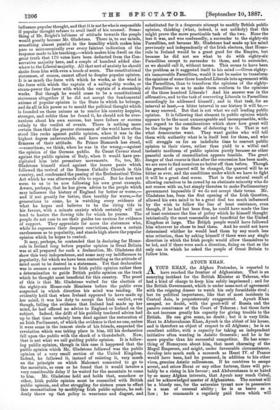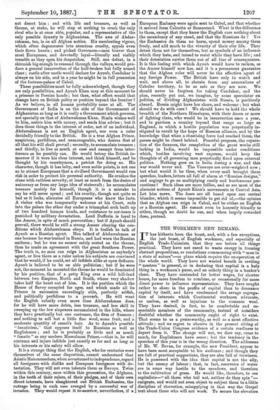AYOUB KHAN.
AY017B KHAN, the Afghan Pretender, is reported to have reached the frontier of Afghanistan. That is an annoying incident for the British Minister at Teheran, who had a kind of charge to keep him safely imprisoned ; and for the British Government, which is under some sort of agreement with the reigning Ameer to watch his only formidable rival ; but its political importance, like that of most incidents in Central Asia, is preposterously exaggerated. Ayoub Khan escaped, no doubt, with the good-will of Russia and the passive connivance of the Court of Teheran ; but those facts do not increase greatly his capacity for giving trouble to the British. He can give some, no doubt ; but it is very little. Next to Abdurrahraan Khan, Ayoub is the ablest of his house, and is therefore an object of respect to all Afghans ; he is an excellent soldier, with a capacity for taking an independent initiative often wanting in Asiatic Generals ; and he is far more popular than his successful competitor. He has some- thing of Hnmayoon about him, that most charming of the Mogul Emperors, and might, under favourable circumstances, develop into much such a monarch as Henri IV. of Prance would have been, had he possessed, in addition to his other vices, genuine Asiatic callousness. If he contrives to escape arrest, and seizes Herat or any other fortress, there will pro- bably be a rising in his favour ; and Abdurrahman is so hated by so many Afghan interests, that Ayoub may reach Cebu', and be acknowledged master of Afghanistan. The contest will be a bloody one, for the saturnine tyrant now in possession is a man of unusual ability ; he is as brave as a lion ; he commands a regularly paid force which will not desert him ; and with life and treasure, as well as throne, at stake, he will stop at nothing to crush the only rival who is at once able, popular, and a representative of the only possible dynasty in Afghanistan. The awe of Abdur- rahman, too, is on all Afghan nobles. His unrelenting vigour, which often degenerates into atrocious cruelty, appals even their fierce hearts ; and picked Governors—men braver than most Europeans, and devotedly loyal—literally and visibly tremble as they open his despatches. Still, one defeat, in a skirmish big enough to resound through the valleys, would pro- duce a general insurrection of the half-broken but fully armed clans ; castle after castle would declare for Ayoub, Candahar is always on his side, and in a year he might be in fall possession of the fortress-palace of Cabal.
These possibilities must be fully acknowledged, though they are only possibilities, and Ayoub Khan may at this moment be a prisoner in Persian hands ; but then, what effect would that change have on British policy or position beyond the frontier ? As we believe, in all human probability none at all. The Government of India is on the side of the Government of Afghanistan so long as it is really a Government which governs, not specially on that of Abdurrahman Khan. Simla wishes well to him, assists him with money, and sends him advice ; but it does those things in the interest of order, not of an individual. Abdurrahman is not an English agent, nor even a ruler decidedly friendly to the British. He is a true Afghan Prince, suspicious, perfidious, and unmanageable, who desires first of all that his will shall prevail ; secondly, to accumulate treasure ; and thirdly, to live as much at ease and exempt from inter- ference as he possibly can. He would betray the British to- morrow if it were his clear interest, and think himself, and be thought by his countrymen, a patriot for doing so. His character, though it has lofty, and even noble points, is not one so to attract Europeans that a civilised Government would run risk in order to protect his personal authority. He crushes the clans with ruthless severity, at least as much from the desire of autocracy as from any large idea of statecraft ; he accumulates treasure mainly for himself, though it is a mistake to say he will never spend ; and his cruelty, though not quite no bad as it looks, alienates all Europeans who know the facts. A visitor who was temporarily welcome at his Court, rode into the palace the other day under a triumphal arch built up of two hundred human heads, and resistance to sur-taxes is punished by military devastation. Lord Dufferin is loyal to the Ameer, in spite of much provocation ; but if Ayoub should prevail, there would be still a strong Ameer obeying the con- ditions which Abdurrahman obeys. It is foolish to talk of Ayoub as a Russian agent. Men talked of Abdurrahman as one because he was trained in Russia, and had worn the Russian uniform ; but he was no sooner safely seated on the throne, than he made an agreement with the great Southern Power. The truth is, no man can reign in Afghanistan as anybody's agent, or live there as a ruler unless his subjects are convinced that he would, if he could, set all infidels alike at open defiance. Ayoub is believed to be an able politician ; but if he were not, the moment he mounted the throne he would be dominated by his position, that of a petty King over a wild hill-land between two Empires, North and South, whose very shadow takes half the heart out of him. It is the position which the HOMO of Savoy occupied for ages, and which made all its Princes in succession exceedingly able, perfectly selfish,
and politically perfidious to a proverb. He will want the English subsidy even more than Abdurrahman does, for he will have more debts, less treasure, and less skill in sweeping up the few sixpenees accumulated in the hills, where they have practically but one customer, the firm of Bassoon ; and nothing to sell but a little fine wool, some fruit, and a moderate quantity of camel's hair. As to Ayoub's possible "fanaticism," that opposes itself to Russians as well as Englishmen ; and he is probably as little and as much "fanatic" as any modern Mussulman Prince,—that is, he will contemn and injure infidels just exactly so far and ae long as his interests or his safety will allow.
It is a strange thing that the English, who for centuries were themselves of the same disposition, cannot understand that Asiatic Mahommedane, when accustomed to independence, regard all foreigners with dislike and European foreigners with de- testation. They will not even tolerate them as Envoys. Twice within this century, once within this generation, the Afghans,
in the teeth of their rulers, of their pledges, and of their own direct interests, have slaughtered out British Embassies, the outrage being in each case avenged by a successful war of invasion: They would repeat it to-morrow, nevertheless, if a, European Embassy were again sent to Cabul, and that whether it arrived from Calcutta or Samaroand. What is the difference to them, except that they know the English care nothing about the ascendency of any creed, and that the Russians do ? Yet the Embassies do them no harm, spend money among them freely, and add much to the vivacity of their city life. They detest them not for themselves, but as symbols of an influence which they hate, and intend to resist while they have life ; and their detestation carries them out of all fear of consequences. It is this feeling with which Ayoub would have to reckon, as the Ameer himself now has, and it is a permanent guarantee that the Afghan ruler will never be the effective agent of any foreign Power. The British have only to watch and wait, and above all, to abstain from any annexations of Cabulee territory, to be as safe as they are now. We should never be forgiven for taking Candahar, and the plan, recently put out, we imagine, by some speculator on politics, of dividing Afghanistan with Russia, is positively absurd. Russia might have her share, and welcome ; but what should we do with ours ? We should have to hold the whole breadth of the Northern Himalayas, with their dozen or more of fighting clans, who would be in insurrection once a year, and to garrison a country beyond that range as large as England, in which a hostile population was perpetually in- stigated to revolt by the hope of Russian alliance, and by the knowledge that when a chastising force had reached them, the passes might be closed behind. Peaceful progress, the repara- tion of the finances, the completion of the great works still lacking in India, would be impossible under conditions which, besides involving vast expense, would keep the thoughts of all governing men perpetually fixed upon external politics. Nothing goes on in India during a war, and this war would never end. The Viceroys are over-weighted now ; but what would it be then, when every mail brought them speeches, leaders,letters all full of alarm at "Russian designs," and urgings to go on multiplying costly and burdensome pre- cautions ? Such ideas are mere follies, and so are most of the alarmist notices of Ayoub Khan's movements in Central Asia. Let him move. The fears are all based upon one central blunder, which it seems impossible to get rid of,—the opinion that an Afghan can reign in CAM, and be either an English or a Russian agent. He cannot even be honestly friendly to either, though no doubt he can, and when largely rewarded does, pretend.



































 Previous page
Previous page